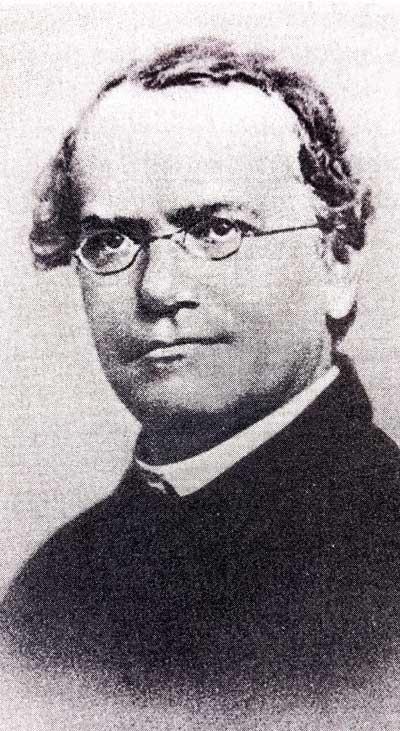Reply To:
Name - Reply Comment
Gregor Johann Mendel, the ‘father of modern genetics’ was born 200 years ago on July 20, 1822. Scientists have advanced in genetics in leaps and bounds because of one individual who pursued in understanding the truth of inheritance. Although later acknowledged, Mendel’s work provided the scientific evidence for the existence of ‘units of inheritance’ which we now know as genes. This crucial discovery became the basis of understanding how the pattern of life continued to evolve diversity, individuated and became different from its parents. Its implications are vastly found in understanding inherited human diseases, but most of all, in knowing that this is where the germinating seed of the secret of life can be discovered.
advanced in genetics in leaps and bounds because of one individual who pursued in understanding the truth of inheritance. Although later acknowledged, Mendel’s work provided the scientific evidence for the existence of ‘units of inheritance’ which we now know as genes. This crucial discovery became the basis of understanding how the pattern of life continued to evolve diversity, individuated and became different from its parents. Its implications are vastly found in understanding inherited human diseases, but most of all, in knowing that this is where the germinating seed of the secret of life can be discovered.
"Although later acknowledged, Mendel’s work provided the scientific evidence for the existence of ‘units of inheritance’ which we now know as genes"
Mendel was a uniquely gifted individual who was interested in knowing the truth behind natural sciences, unlike his parents, Anton and Rosine, who were both peasant farmers in a small village in Austria. But endless economic hardships were ruthless on Mendel and he intermittently suffered bouts of depression. Having completed the university entrance qualifications at the Philosophical Institute of the University of Olmütz, he made a critical decision in his life, in 1843 at the age of 21, to become a Catholic priest of the Augustinian monastery of St Thomas in Brünn. While studying theology and he also pursed his growing interest in the natural sciences. In the Vienna University Mendel received a top-class training in physics and probability theory and under F. Unger learned cell biology and cytology. He voraciously read the work of great German botanist Carl Friedrich von Gaertner and his experiments on hybrid plants.
"Celebrating Mendel’s birth also means to uphold his view of the world"
Mendel believed that “the only way to scientific truth was through experimentation”. In the garden of his monastery in 1854 so he began to experiment with garden pea, Pisum. For his crossbreeding programme he selected those discontinuous traits which provided him with ‘a differentiating character,’ for the study. He selected 22 varieties from 34 closely related ones and eventually chose 7 pairs of plants, each having a distinguishable feature: known today as Mendalian traits, for example, yellow and green peas. Mendel defined the terms dominant and recessive for these discontinuous traits and by arduous and meticulous counting he found them to be distributed in the progeny in the ratio of 3:1. This was the groundbreaking moment for Mendel. His observant eye captured what Gaertner considered as the ‘inner nature’ which is a reflection of the Divine purpose, now following a physical law of distribution in the new generation. So, there was no dilution or blending of inheritance in the offspring, but segregation of traits from the parents. Experimenting further, Mendel demonstrated that these traits, such as seed colour and seed shape, were independently assorted by his second law. Hence, a trait that may have disappeared in one generation may appear again in successive generations. He published his results in the Journal of the Natural Science Society in Brünn in 1866 titled ‘Experiments on Plant Hybrids’. It had been largely ignored by many and heavily criticized by some, but in 1900s it was rediscovered for its vast implications on the universal mechanism of heredity.
"In his last years, the Abbot Mendel adhered to an adamant position in opposing oppressive taxation imposed by the government. For him ethical living mattered"
 Today, Mendel is not just a name but an entire discipline of science, the science about inheritance. A metabolic disorder like Alkaptonuria was one of the first diseases to be recognized as an autosomal recessive condition following Mendelian inheritance. Mendel would have never imagined that his language of inheritance would be used today in human disease diagnosis; certainly, not a genetic database, Online Mendelian Inheritance in Man (OMIM) which uses Mendelian terms of dominant-recessive characterization in disease classification. Even a complex disease such as cancer is assessed for various genetic predispositions through the lens of Mendelian inheritance. Although genetics as a discipline has matured to grasp the complexity of various diseases, Mendel’s fundamental insight in biology is universally recognised and acknowledged today.
Today, Mendel is not just a name but an entire discipline of science, the science about inheritance. A metabolic disorder like Alkaptonuria was one of the first diseases to be recognized as an autosomal recessive condition following Mendelian inheritance. Mendel would have never imagined that his language of inheritance would be used today in human disease diagnosis; certainly, not a genetic database, Online Mendelian Inheritance in Man (OMIM) which uses Mendelian terms of dominant-recessive characterization in disease classification. Even a complex disease such as cancer is assessed for various genetic predispositions through the lens of Mendelian inheritance. Although genetics as a discipline has matured to grasp the complexity of various diseases, Mendel’s fundamental insight in biology is universally recognised and acknowledged today.
Celebrating Mendel’s birth also means to uphold his view of the world. In his last years, the Abbot Mendel adhered to an adamant position in opposing oppressive taxation imposed by the government. For him ethical living mattered. With emergence of new techniques in genetics and biotechnology humanity may run the risk of implementing ways to build racial superiority through Eugenics. History has seen how US sterilization programme and immigration laws and Nazi policies were adopted to the detriment of societal development. Therefore, scientific advancement today needs to safeguard itself by forming polices against the Eugenic agenda, politicized under the guise of race/national preservation, so that grave dangers can be avoided for human progress.
"With emergence of new techniques in genetics and biotechnology humanity may run the risk of implementing ways to build racial superiority through Eugenics"
Celebrating Mendel’s bicentenary scientists are concretely planning through partnership development- Bill and Melinda Gates Foundation and the US National Institutes of Health- to find therapies for blood disorders such as Sickle Cell Disease which is widely found in Africa. Such scientific involvement is praiseworthy for it brings about equitable health care in the world while reaching out to those with most medical needs. Similarly, the developed world needs to become aware of the challenges for scientific progress faced by the developing world so that policies can be drawn for just sharing of wealth and resources through funding organizations and grant bodies.
As Sri Lanka is currently facing innumerable setbacks because of financial mismanagement, corrupt governance and unscientific polices, must we not aspire to Mendel’s legacy? One may feel that we are encumbered by our ill-fated inheritance in society. However, I strongly feel that Mendel’s tenacity in the face of economic hardships, his meticulous nature in experimentation, his commitment to seeking furtherance of true knowledge and his principles of ethics in the face of structural abuse must be inspiring to all sectors in our society. Let this bicentenary celebration of Mendel’s birth be a launching pad for knowing the genetics of inheritance to impact societal change, we all seek today.
The writer is a Senior Lecturer, Department of Biochemistry
Faculty of Medicine Sabaragamuwa University of Sri Lanka and can be reached at [email protected]